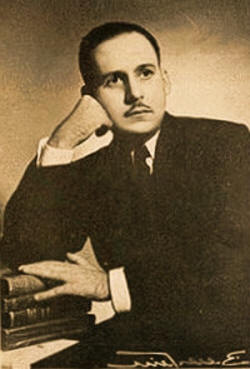

Queer Places:
Columbia University (Ivy League), 116th St and Broadway, New York, NY 10027
 Emilio Ballagas Cubeñas (b. Camaguey; November 7, 1908 - d. Havana; September 11, 1954) was a Cuban poet and essayist of recognized prestige in the literary field of the twentieth century. He is considered one of the most excellent growers of Neo-Romanticism and blackish poetry in Cuba.
When Virgilio Piñera wrote
about the homosexuality of his fellow Cuban, the poet Emilio Ballagas, in an
essay published the year after Ballagas’ death, ‘Ballagas en persona’ (1955),
it made sense to do so in terms of international culture. José Quiroga
comments that, in Piñera’s essay ‘Ballagas becomes not solely a Cuban poet,
but part of a transnational network of male homosexual writers like
Gide and
Wilde.’
Emilio Ballagas Cubeñas (b. Camaguey; November 7, 1908 - d. Havana; September 11, 1954) was a Cuban poet and essayist of recognized prestige in the literary field of the twentieth century. He is considered one of the most excellent growers of Neo-Romanticism and blackish poetry in Cuba.
When Virgilio Piñera wrote
about the homosexuality of his fellow Cuban, the poet Emilio Ballagas, in an
essay published the year after Ballagas’ death, ‘Ballagas en persona’ (1955),
it made sense to do so in terms of international culture. José Quiroga
comments that, in Piñera’s essay ‘Ballagas becomes not solely a Cuban poet,
but part of a transnational network of male homosexual writers like
Gide and
Wilde.’
He graduated with a Bachelor's degree in Letters and Sciences from the Institute of Second Teaching of Camaguey, in 1926. He began his studies in pedagogy at the University of Havanain 1928.
In 1931 he published his first book: Joy and Escape. Later, in 1933, he obtained the title of Doctor of Pedagogy from the University of Havana. He held the Chair of Literature and Grammar at the Normal School for Teachers of Santa Clara, a position he held until 1946. In 1934 his Black Poetry Notebook first appeared. The following year, he held the position of editor of the newspaper La Publicidad, Santa Clara, until 1943. Later, he published Elegy without a name and offered the conference "Parable of Contemporary Spanish Poetry" at the Spanish-Cuban Institution of Culture. He traveled through France in 1937, being commissioned by the Ministry of Education to conduct research on manuscripts by American authors preserved in the National Library of Paris. A year later he introduced to the large audience Night and Elegy. The Directorate of Culture of the Ministry of Education of the Republic of Cuba awarded him an Honorable Mention for his works Taste Eternal and Serge Lifar, the man of space. From 1942, he worked with Gastón Baquero, Eliseo Diego, Fina García Marruz and Cintio Vitier, as editor of Clavileño magazine. He took part in the cycle organized by the Literature Section of the Athenaeum of Havana "Yesterday's Poets Seen by Today's Poets", with a lecture on José María Heredia. He gave two lectures at the Cultural Association of Catholics: "Ulysses Back" and "Inner Castle of Poetry". In 1943 he directed the magazine Fray Junípero. Notebooks of spiritual life. He obtained a Doctor of Philosophy and Letters degree from the University of Havana in 1946. He was awarded a scholarship from the Institute for the Education of the Blind in New York, an institution dedicated to teaching the blind. There he remained until 1947, learned braille and met the American poet Fred K. Tarrant. During his time in the United States he lectured in the free courses at Columbia University and the Hispanic House of New York. The National College of Journalists accredited him with the certificate of Professional Journalistic Aptitude. In 1947, and still in New York, he married Antonia López Villaverde, a teacher at the Normal School for Teachers in Havana, whom he knew from his university years, and with whom he had a son, Manuel Francesco, in 1948.
He died in Havanaon September 11, 1954, two months before his 46th birthday.
My published books: